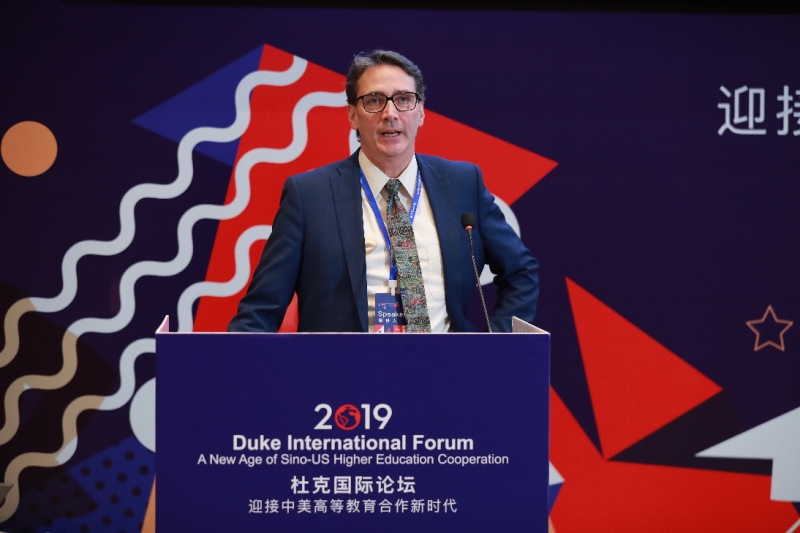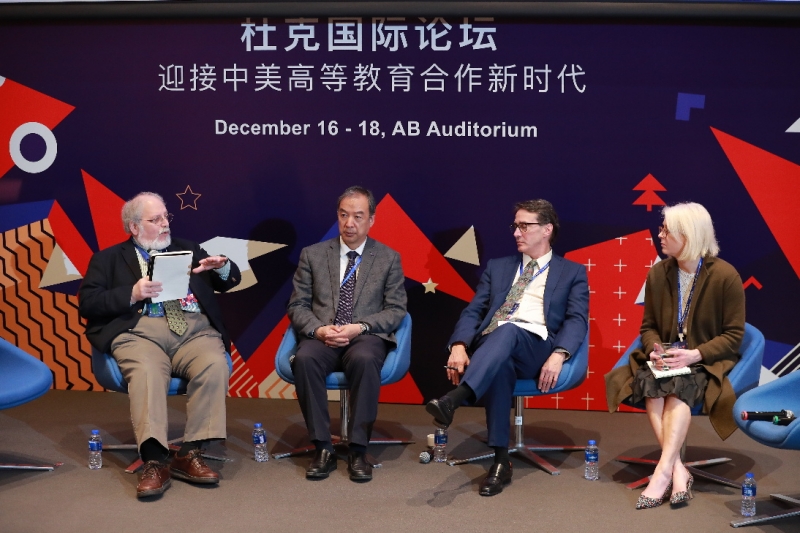
Brad Farnsworth, vice president for internationalization and global engagement at the American Council on Education
By Craig McIntosh
Higher-education leaders in China and the United States should create a working group to set clear standards on transnational research collaboration in order to reduce suspicion on campuses, said Brad Farnsworth, vice president for internationalization and global engagement at the American Council on Education (ACE).
Speaking at the 2019 Duke International Forum in Kunshan, Farnsworth urged Chinese and American universities to engage directly to establish norms and rules that can prevent tensions between Beijing and Washington from affecting research.
‘I feel we’ve talked about this issue enough. It’s time to come up with a response,’ he said.
Suspicion surrounding China-U.S. academic and research partnerships has grown in recent years, with reports by think tanks and U.S. government agencies citing strategies such as Made in China 2025 and the Thousand Talent Plan (TTP) as examples of China’s desire to overtake the U.S. in science and technology.
However, Farnsworth argues that the situation is often oversimplified. Looking at some of the TTP contracts Chinese universities have signed with overseas scholars, for example, he said it was clear institutions have discretion in how they determine and apply such agreements.
‘The evidence suggests that the goals are broadly set by the center, and the individual institutions are left to negotiate the specific terms of each appointment,’ he said. ‘I think this provides a real opportunity for the U.S. and China to jointly develop standards of good practice that would address the concerns and provide a renewed stimulus for transnational research collaboration.’

Farnsworth takes part in a panel discussion with (from left) Denis Simon, executive vice chancellor of Duke Kunshan;
Baocun Liu, director of the Institute of International and Comparative Education at Beijing Normal University;
and Karin Fischer, journalist and research associate at the Center for Studies in Higher Education at the University of California, Berkley
He suggested that national organizations in the two countries establish a task force to develop norms and policies for research agreements, which would be a condition for institutional collaboration and would cover visiting scholars.
Long term, Farnsworth said he was optimistic about the China-U.S. relationship, but he stressed that the current situation represents a fundamental shift.
‘The U.S. needs to recognize that China is a peer country,’ he said. ‘When we talk about developing the norms for research, we need to do it with China. The U.S. can no longer unilaterally set the rules.’
In a panel discussion after Farnsworth’s presentation, Denis Simon, executive vice chancellor of Duke Kunshan, said he believes people-to-people diplomacy is the best remedy for the tensions between China and the U.S.
‘Beijing and Washington can argue with one another, but if we can find relationships where we can have honest dialogue, then maybe we can get groups of people working together to build trust,’ he said. ‘We need to work from the bottom up, not the top down.’
The 2019 Duke International Forum, which ran from Dec. 16 to 18 under the theme ‘A New Age of Sino-U.S. Higher Education Cooperation,’ attracted influential academics and administrators from a host of leading universities, as well as experts from think tanks and education associations.

